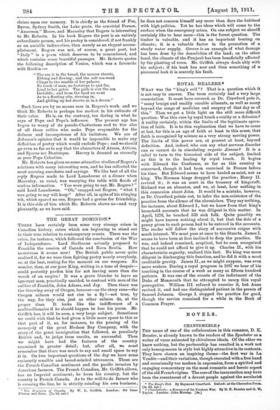ROYAL HEALERS.*
WHAT was the "king's evil"? That is a question which it is not easy to answer. The term certainly had a very large connotation. It must have covered, as Dr. Crawfurd puts it, " many benign and readily curable ailments, as well as many beyond the range of medicine and surgery of that day or of this." Then we get a little light on the still more difficult question: Was this cure by royal touch a reality or a delusion? A reality certainly, within the limits of the legitimate opera- tion of faith. It is to this explanation that we have to come at last, for this is an age of faith at least in this sense, that faith is recognized by science as a very strong moving power. The limits of this power are, at present at least, beyond definition. And, indeed, who can say what nervous disorder can or cannot do in simulating organic disease? It is a relief to turn to the historical side of the subject, limited as this is to the healing by royal touch. It begins with Edward the Confessor, so far as this country is concerned, though it had been exercised in France before his time. But Edward seems to have healed as saint, not as king. The Norman kings dropped the practice; Henry II. revived it ; it was an asset in the treasury of kingcraft. Richard was an absentee, and we,• at least, hear nothing in this connexion about John. It would be a mistake, however, as Dr. Crawfurd points out, to infer the non-existence of the practice from the silence of the chroniclers. They say nothing, for instance, about Edward I., but we know from that king's household accounts that he was diligent in this matter. In April, 1278, he touched 533 sick folk. Quite possibly we might have known nothing about it, but that the dole of a penny given to each person had to be entered in the accounts. The reader will follow the story of successive reigns with much interest. We must pass at once to the Stuarts. James L seems to have been at first inclined to drop the practice. He was, and indeed remained, sceptical, but he soon recognized that he could not afford to give it up. Charles IL, with his characteristic sagacity, realized this fact. No king was more diligent in discharging this function, and he did it with a most creditable gravity. James II., as we might suppose, was even more zealous. During a royal progress in 1687 we hear of his touching in the course of a week as many as fifteen hundred patients. It was one of the counts of the indictment of the Duke of Monmouth that he attempted to usurp this royal prerogative. William III. refused to exercise it, but Anne revived it, and had one distinguished patient in the person of Samuel Johnson. George L stopped the practice for good, though the service remained for a while in the Book of Common Prayer.


































 Previous page
Previous page